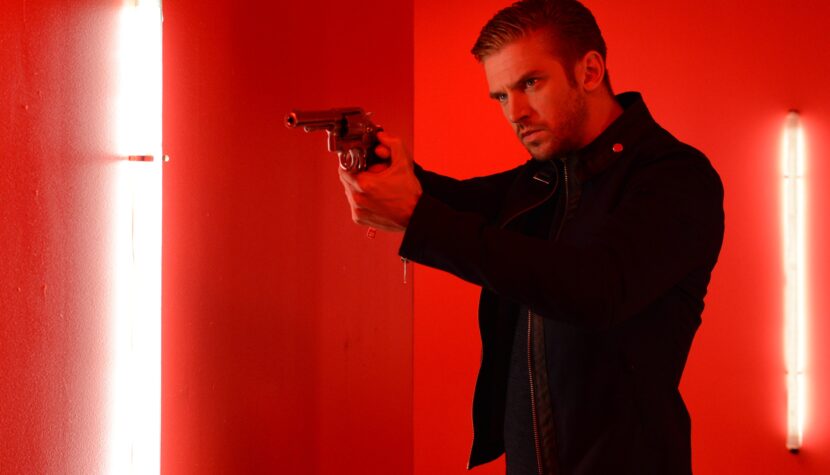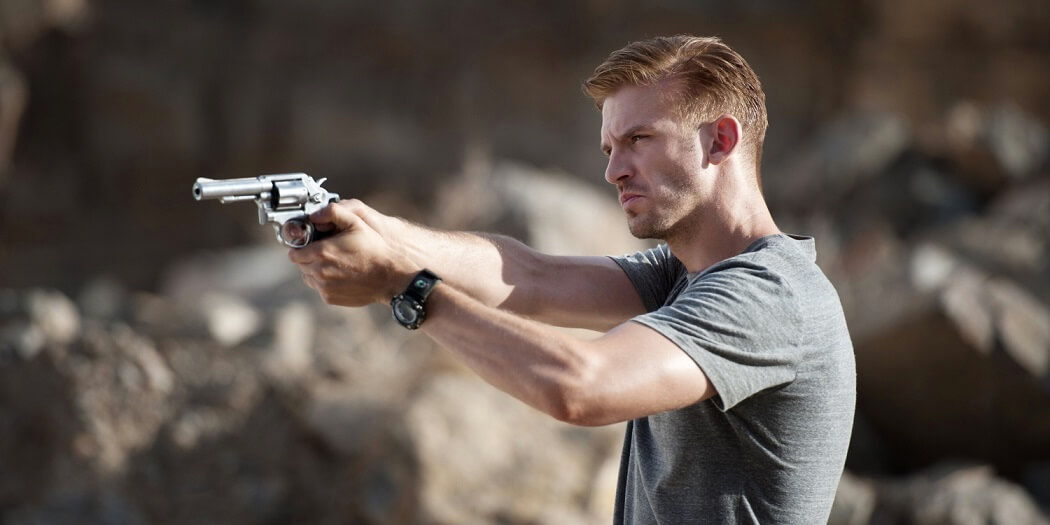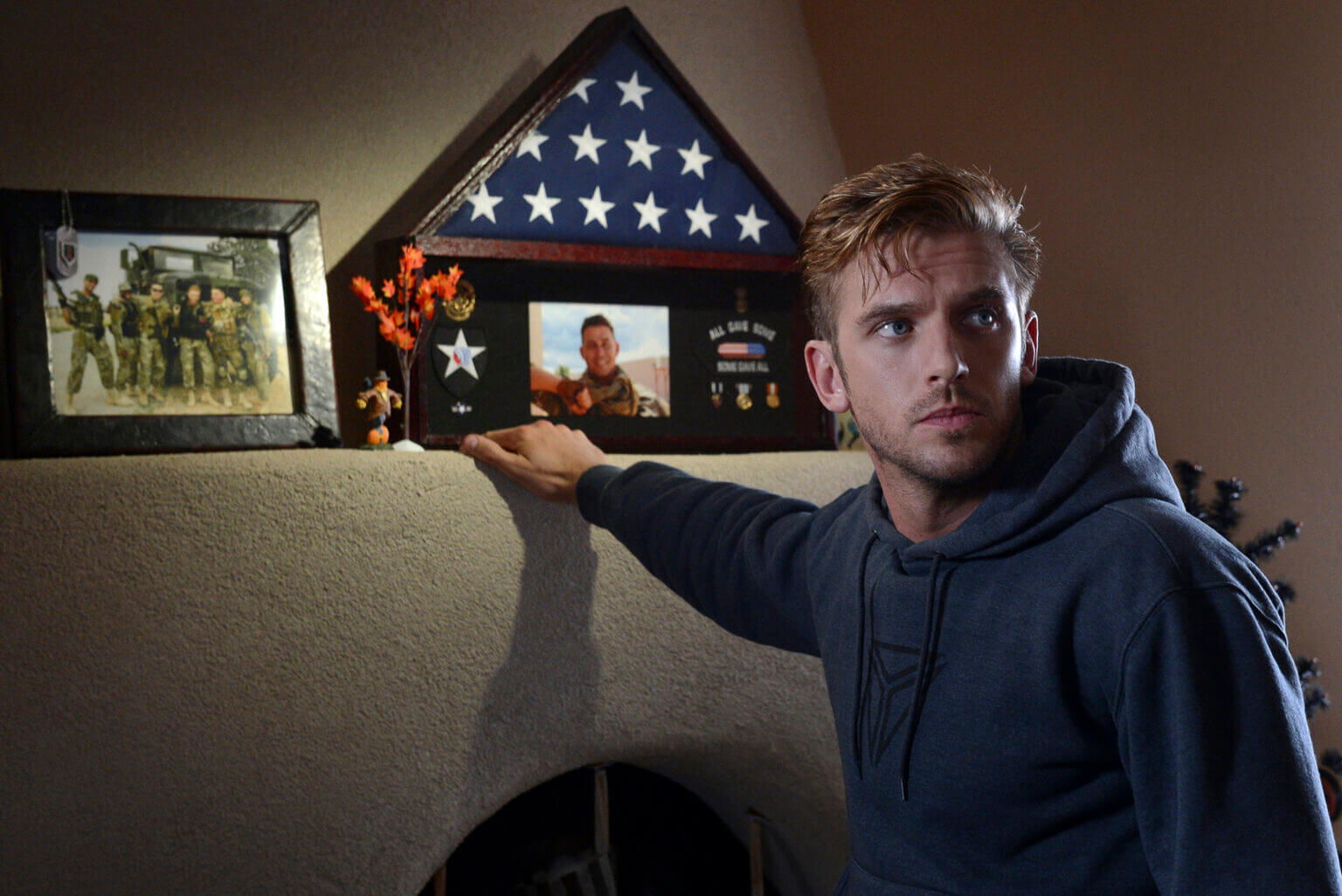THE GUEST. A thriller straight from the 80s that will surprise fans of the VHS era cinema

Giving the guest nine stars puts me in an uncomfortable position of defending this rating more than if I had given him a solid eight. Because nine is almost ten, almost a masterpiece, a nearly flawless film that ranks among the top of the year. Such a rating also says a lot about the undersigned, for whom Adam Wingard’s new thriller seems better than the recently reviewed Gone Girl. The guest lacks the ambition, depth, and artistry of Fincher’s latest film, which should disqualify it in a direct comparison, especially since both productions belong to the same genre. However, it’s hard to find two more different thrillers.
David introduces himself to the Peterson family as a friend of their recently deceased son, who died in military service. Both were in the same unit, confirmed by photos and David’s words, who promised to visit and help them upon his return. Indeed, he quickly bonds with all family members, from parents to siblings. He is polite, caring, well-mannered, and at the same time, he can handle more demanding situations, such as helping the teenage son deal with bullies. However, the viewer becomes wary because the music consists of ominous synthesizer sounds, and when no one is looking, David’s face takes on a disturbingly expectant expression. For what? Nothing good.
The Guest lacks originality, immediately evoking associations with films where a mysterious stranger with a pleasant appearance turns out to have an exceptionally twisted psyche. Usually, these titles were monosyllabic and precisely described the main character. Do you remember The Hitcher, Stepfather? However, in those thrillers, we quickly learned the motivation and true nature of the characters, while here, they remain a mystery for a long time. Wingard and his regular screenwriter, Simon Barrett, gradually introduce elements contradicting David’s ideal image. The brutality he abuses and the precision with which he adapts to every situation. Whether it’s family conversations or casual sex, he can handle it effortlessly. But the creators take their time to answer the more interesting question about David’s character. Is he a hero or a villain? A soldier with a mission or a madman threatening everyone? This ambivalence towards the titular guest works better because Dan Stevens, with his golden smile and open heart, looks like the nicest guy on earth. Even if we sense that it’s just a facade, we want to believe in his good intentions.

Stevens as David is excellent. Convincing in every scene, he somewhat resembles Matthew Goode from Stoker, whose kindness and perfection also demanded caution. The second most important character is Anna, the Petersons’ twenty-year-old daughter, the only one suspicious of the guest. For a significant part of the film, she wears a conspicuous blue and yellow waitress apron, resembling a fairy-tale character threatened by a wicked wolf or another predator. However, Maika Monroe in this role is not as naive and defenseless as one might think. Moreover, the strength of the film largely lies in uncovering the cards we supposedly know but are still surprised by the turn of events. Why?
The changes in David’s behavior shape the film. The poster and trailers suggest that it’s a thriller, although it’s not clear in which direction it’s heading. The seriousness with which the world is built seems artificial, although the film tries hard not to fall into pretense. However, when we learn the true goal of the titular character, all brakes are off. Everything is possible; unpredictability rules the screen, and the creators are not afraid to verge on absurdity while attempting to scare the audience. Wingard’s film is also a horror, focused on shocking the viewer with unexpected plot twists and sudden outbursts of violence that have something… relaxing. I haven’t seen a film where violence served as unrestrained fun in a long time. Closer to the end, there is more of it, and it is more vivid, but instead of repelling, it brings joy. David’s actions may disgust some viewers, but each one brings us closer to the true nature of The Guest, hailing straight from B-movie thrillers of the 80s.
The creators mix their favorite elements from that era’s cinema, from plot motifs to classic execution and distinctive music creating the right atmosphere, creating a cohesive structure that is a tribute rather than a poor imitation. The director understands the strengths and weaknesses of the cinema he grew up with, making The Guest not a reheated cutlet but a surprise even for connoisseurs of less ambitious VHS-era productions. However, do I have the right to give such a high rating to a work that offers nothing beyond secondary entertainment? And is it really secondary?

Wingard doesn’t try to analyze anything or hit anyone. Instead, he goes back to the era of entertainment cinema that could combine a simple script with stylistic exaggeration. Where plot twists didn’t meet viewers’ objections but admiration, and literalness was very conditional. Even the director’s previous film, You’re Next, was a homage to 80s cinema, but comparing the two titles, the former seems like a mere warm-up. The Guest consists of purely cinematic associations, making it most enjoyable for fans of this joyful type of creativity. However, even without this knowledge, Wingard’s work holds its own. It acknowledges the superiority of the “old school” over current standards while playing with the viewer’s familiarity and expectations. It engages in cinema without falling into parody or simple pastiche. A bit like Drive, Refn engages in a dialogue with his inspirations. Some will laugh (or not) at the absurd last scene, others at how much it resembles a certain famous film by John Carpenter.
The Guest remains true to its ideals until the end, and for this sincerity, I can’t evaluate it differently.

